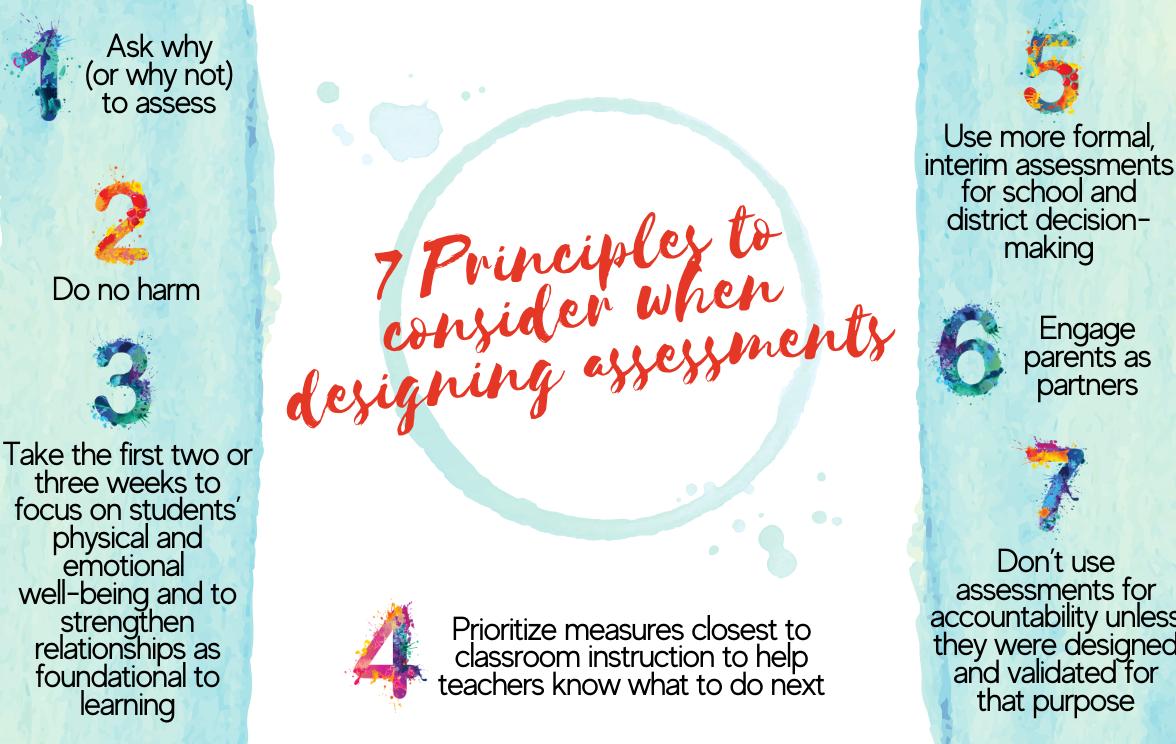
5 minute read
Collegiate Composition: “Teaching During COVID-19”
Teaching During COVID-19
Why should principals have background knowledge of effective instructional and assessment strategies during a pandemic? Moreover, why should teachers have background knowledge of effective instructional and assessment strategies during a pandemic? To answer these questions, I will explore specific recommendations to consider concerning instructional and assessment strategies during a pandemic.
In less than a year, the world has rapidly changed through the lives of students, parents, teachers, and principals due to the pandemic. As a result, change has been the only area to remain constant whether it be how the instruction and assessments are delivered or how learning has occurred. Therefore, we must consider the impact of the pandemic on student learning. Related Studies
Based on norms provided in Star Reading (grades K-12) and Star Math assessments (1-12), Wyse, Stickney, Butz, Beckler, and Close (2020) conducted a study that utilized three hypotheses: 1) Did a student stop learning (measured at the end of March) when COVID-19 started? 2) Did a student advance a month (measured at the end of April) in their learning after COVID-19? 3) Did a student decline a month (measured at the end of February) in their learning after COVID-19? The results of the study indicated that a greater percent of students were below benchmarks compared with the end-of-year values. Furthermore, they discovered that students in the lower grades seemed to be affected to a greater point. This finding is no surprise. From the perspective of an instructional leader, it is important to consider what instructional strategies might be employed to assist students in “catching up” the critical skills missed or not mastered from the previous year. Wyse et al. (2020) suggests to think about providing extra resources at early grades to help students catch up or prioritize what skills are taught in these grades. In addition, they suggest to frameworks such as MTSS/RTI frequently to identify needs and target instruction.
Lake and Olson (2020) summarized findings from a panel of assessment experts on diagnostic assessments and the role these assessments play in assisting educators and parents support student learning. They furthermore developed seven principles to consider when designing assessments.



Dr. Jeff Cornelius
Dr. Jeff Cornelius is a Professor of Education and Department Chair at the University of North Alabama. A native of Tuscumbia, AL, he received degrees from Mississippi State University, University of North Alabama, and Samford University. He also has served as a classroom teacher, assistant principal, principal, and assistant superintendent.
jdcornelius@una.edu
this manuscript by Lake and Olson (2020) and obtain a copy for an indepth narrative on each of the seven principles, particularly if you as an instructional leader need assistance to support teachers in the area of assessment during the pandemic. Often times, it is a difficult challenge to know how to meet the needs of individual learners much less in a global pandemic. Practical Experience and Strategies
As a previous building-based school principal, I have experienced many challenges throughout my career. I have not been an instructional leader during a pandemic. But, I have taught graduate courses and worked in a leadership capacity during a pandemic. Therefore, I will share with you some practical advice that have worked for me. I hope that you find these strategies helpful in working with students and adults. These practical strategies are as follows: 1)Be a great listener.
More often than not, students/faculty simply need their voices to be heard. I have found in most cases that listening is a skill that we have to be intentional to develop. You may not be able to solve every problem nor should you be expected too. However, listening to the needs of others is a very important skill of an instructional leader. 2)Be an effective communicator.
Do not assume. I have found that clear communication is the key to success in both teaching and working with people. During this pandemic, it is of utmost importance to ramp up the communication efforts. Consider having a go-to person to review any written or oral communication prior to communicating it. It is also helpful to anticipate questions in advance. 3)Be a great facilitator.
Remember the old adage, actions speak louder than words, this adage still holds true. It is critical for teachers to witness an instructional leader that serves in both an active and participatory role. How many times have you witnessed as a teacher an instructional leader that never participated nor was present at data meetings or at some other important function?
This article discusses instructional and assessment strategies to consider during a pandemic. Moreover, the article shared some practical insights from the lens of a previous instructional leader. It is my hope that the article provided you with theoretical and practical knowledge of both instructional and assessment strategies.
References
Lake, R., Olson, L., & Center on Reinventing Public Education (CRPE). (2020). Learning as We Go: Principles for Effective Assessment during the COVID-19 Pandemic. Center on Reinventing Public Education. https://ezproxy.una.edu/login?url=https://search.ebscohost.com/login.aspx?direct=true&AuthType=ip,cookie&d b=eric&AN=ED606373&site=eds-live&scope=site
In Partnership with
NEW! AFFORDABLE INTERACTIVE FLAT PANEL DISPLAYS And MUCH More. Get Active in the Classroom!









Interactive Floor Interactive Playground










• Ask for a quote on Flat Panel Displays. • Engage students with an interactive
floor or wall.
• Stop the Literacy slide with Augmented
Reality. Evidence-based Supplemental
Curriculum.
PowerUpEDU offers technology and professional learning solutions for ALL Classroom Learning Environments.









